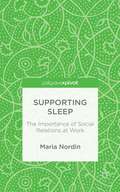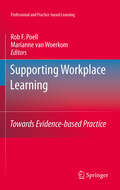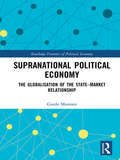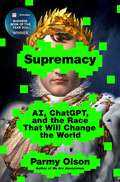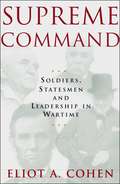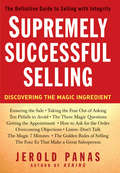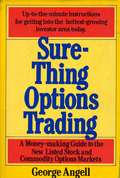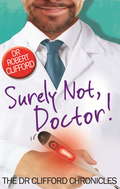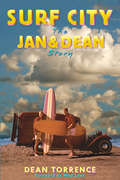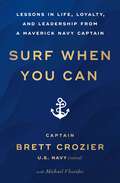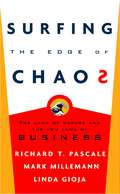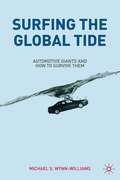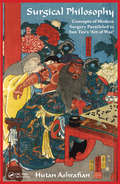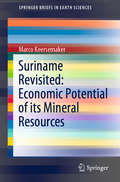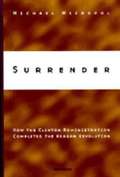- Table View
- List View
Supporting Students through High-Quality Teaching: Inspiring Practices for University Teachers (Springer Texts in Education)
by Satu TuomainenThis book provides a Finnish perspective on high-quality teaching in higher education and explores Finnish approaches on teaching, learning and supporting students. It addresses the concepts of quality in teaching, teaching excellence and effective teaching in today’s higher education in which the student body has become increasingly international and heterogenous. The book discusses how the role of the teacher has changed from authority to facilitator in the past decades while many students still value their university experience based on the teachers they encounter. The book provides a practitioner view on how students can be supported through communication, compassion and expertise and how professional and pedagogical development are essential for high-quality teaching in an increasingly competitive, diverse and online world of higher education. The book introduces the principles of Finnish higher education and universities, and the Finnish education system in connection with the approach to teaching, teacher education and the highly valued profession of a teacher. What is good teaching in higher education? It can consist of the learning environment, the location, the students and the teacher, and many studies show that effective, compassionate, skilled and humanist teachers will leave their mark on students. It is also equally important for teachers to invest in pedagogical training and conduct research on teaching practices, experiments and students’ perceptions as part of professional development. International classrooms also require specific considerations, as does online learning. The COVID-19 pandemic forced a substantial transfer to online and blended learning in higher education, but can quality teaching exist online, or have we passed the baton to students to be in charge of their learning, to study even more independently?
Supporting Workplace Learning: Towards Evidence-based Practice
by Marianne Van Woerkom Rob F. PoellDuring the 1990s, the workplace was rediscovered as a rich source of learning. The issue of workplace learning has since received increasing attention from academics and practitioners alike but is still under-researched empirically. This book brings together a range of state-of-the-art research papers addressing interventions to support learning in the workplace. The authors are experienced international scholars who have an interest in making HRD and workplace learning practices more evidence-based through practical relevant research. Although workplace learning is largely an autonomous process, many organizations want to manage it as part of their broader HRD strategy. There are limits, however, to the extent to which the complex dynamics of learning in the workplace can be guided in pre-determined desirable directions. This tension between the possible strengths of workplace learning and the limits of managing it is at the heart of this volume. The book is broken into three sections. The first section deals with workplace learning interventions, including HRD practitioners' strategies, training and development activities, and e-learning programs. The second section investigates the impact of social support, or lack thereof, in workplace learning, such as mentoring, coaching, and socialization practices. The third section addresses collective learning in the workplace, looking at teams, knowledge productivity, and collaborative capability building.
Supranational Political Economy: The Globalisation of the State–Market Relationship (Routledge Frontiers of Political Economy)
by Guido MontaniWith the ending of the Cold War and the rise of a nationalistic ‘America First’ strategy, the post-war liberal international order, based upon the hegemonic power of the USA, is fading away. In its place, a multipolar world is emerging which, while offering some the hope of a better future, is also open to disorder and instability. This book offers an insight into the relationship between politics and economics in this new era. As an alternative, this volume argues for a form of global governance that will offer a better balance between politics and economics, based on a supranational approach. A supranational approach in which world powers and UN member states can work in agreement would follow the principle on which European political and economic integration was built. The system put forward here is based on a Keynesian world clearing union and a reform of the World Trade Organization and a United Nations budget, which would accelerate the convergence of rich and poor countries in the aim of a more sustainable global system. This book demonstrates that globalisations and today’s ecological challenges are both a cause of social discontent and an opportunity. Supranational institutions can greatly increase our ability to address global risks, and this book shows how a 'supranational' world order could reduce the uncertainty of the transition from the post-war order to the future multipolar order. The supranational principle enables us to view globalisation, world capitalism and the ecological crisis not only as causes of inequality, poverty and social instability, but also as processes that can be governed. Wise politicians and political parties cannot let the future of humanity be decided by the precarious equilibrium of the Westphalia system. In post-war Europe a group of nation states, once fierce enemies, embarked on a process of integration which led to the abolition of inter-European national borders. With supranational global governance, the same could be achieved in the global system.
Supremacy: AI, ChatGPT, and the Race that Will Change the World
by Parmy OlsonWINNER OF THE THE FINANCIAL TIMES AND SCHRODERS 2024 BUSINESS BOOK OF THE YEAR AWARDIn November of 2022, a webpage was posted online with a simple text box. It was an AI chatbot called ChatGPT, and was unlike any app people had used before. It was more human than a customer service agent, more convenient than a Google search. Behind the scenes, battles for control and prestige between the world’s two leading AI firms, OpenAI and DeepMind, who now steers Google's AI efforts, has remained elusive - until now.In Supremacy, Olson, tech writer at Bloomberg, tells the astonishing story of the battle between these two AI firms, their struggles to use their tech for good, and the hazardous direction they could go as they serve two tech Goliaths whose power is unprecedented in history. The story focuses on the continuing rivalry of two key CEOs at the center of it all, who cultivated a religion around their mission to build god-like super intelligent machines: Sam Altman, CEO of OpenAI, and Demis Hassabis, the CEO of DeepMind. Supremacy sharply alerts readers to the real threat of artificial intelligence that its top creators are ignoring: the profit-driven spread of flawed and biased technology into industries, education, media and more. With exclusive access to a network of high-ranking sources, Parmy Olson uses her 13 years of experience covering technology to bring to light the exploitation of the greatest invention in human history, and how it will impact us all.
Supreme Command
by Eliot A CohenThe relationship between military leaders and political leaders has always been a complicated one, especially in times of war. When the chips are down, who should run the show -- the politicians or the generals? In Supreme Command, Eliot Cohen examines four great democratic war statesmen -- Abraham Lincoln, Georges Clemenceau, Winston Churchill, and David Ben-Gurion -- to reveal the surprising answer: the politicians. Great states-men do not turn their wars over to their generals, and then stay out of their way. Great statesmen make better generals of their generals. They question and drive their military men, and at key times they overrule their advice. The generals may think they know how to win, but the statesmen are the ones who see the big picture. Lincoln, Clemenceau, Churchill, and Ben-Gurion led four very different kinds of democracy, under the most difficult circumstances imaginable. They came from four very different backgrounds -- backwoods lawyer, dueling French doctor, rogue aristocrat, and impoverished Jewish socialist.Yet they faced similar challenges, not least the possibility that their conduct of the war could bring about their fall from power. Each exhibited mastery of detail and fascination with technology. All four were great learners, who studied war as if it were their own profession, and in many ways mastered it as well as did their generals. All found themselves locked in conflict with military men. All four triumphed. Military men often dismiss politicians as meddlers, doves, or naifs. Yet military men make mistakes. The art of a great leader is to push his subordinates to achieve great things. The lessons of the book apply not just to President Bush and other world leaders in the war on terrorism, but to anyone who faces extreme adversity at the head of a free organization -- including leaders and managers throughout the corporate world. The lessons of Supreme Command will be immediately apparent to all managers and leaders, as well as students of history.
Supreme Command: Soldiers, Statesmen and Leadership in Wartime
by Eliot A. CohenDiscussion of how statesmen and the military should interact.
Supreme Command: Soldiers, Statesmen and Leadership in Wartime
by Eliot A. CohenThe relationship between military leaders and political leaders has always been a complicated one, especially in times of war. When the chips are down, who should run the show -- the politicians or the generals? In Supreme Command, Eliot Cohen examines four great democratic war statesmen -- Abraham Lincoln, Georges Clemenceau, Winston Churchill, and David Ben-Gurion -- to reveal the surprising answer: the politicians. Great states-men do not turn their wars over to their generals, and then stay out of their way. Great statesmen make better generals of their generals. They question and drive their military men, and at key times they overrule their advice. The generals may think they know how to win, but the statesmen are the ones who see the big picture. Lincoln, Clemenceau, Churchill, and Ben-Gurion led four very different kinds of democracy, under the most difficult circumstances imaginable. They came from four very different backgrounds -- backwoods lawyer, dueling French doctor, rogue aristocrat, and impoverished Jewish socialist.Yet they faced similar challenges, not least the possibility that their conduct of the war could bring about their fall from power. Each exhibited mastery of detail and fascination with technology. All four were great learners, who studied war as if it were their own profession, and in many ways mastered it as well as did their generals. All found themselves locked in conflict with military men. All four triumphed. Military men often dismiss politicians as meddlers, doves, or naifs. Yet military men make mistakes. The art of a great leader is to push his subordinates to achieve great things. The lessons of the book apply not just to President Bush and other world leaders in the war on terrorism, but to anyone who faces extreme adversity at the head of a free organization -- including leaders and managers throughout the corporate world. The lessons of Supreme Command will be immediately apparent to all managers and leaders, as well as students of history.
Supreme: Remaining Cool While Pursuing Growth
by Jill Avery Sandrine Crener Ranjit Thind Marie-Cecile CervellonFollowing VF Corporation's acquisition of cult streetwear brand Supreme, consumers and industry pundits were nervous that becoming part of a large, public corporation would put an end to Supreme's slow and careful growth trajectory as pressure for quarterly results became more prominent. From its humble beginnings as a skate shop in downtown Manhattan, Supreme had become a global cult brand favored by celebrities, key opinion leaders, and socialites. The mere fact that Supreme was losing its independence could jeopardize its brand mystique. VF's chief financial officer reported that Supreme had more than doubled revenues from $200 million in 2017 and foresaw a clear line of sight to a billion dollars, citing opportunities of further e-commerce penetration as well as expanding the global footprint of Supreme's retail stores. Online fan forums lit up on news of the acquisition, with many expressing concern that a brand once described as "nothing short of a religion to its fervent disciples" would lose its street credibility. Could founder James Jebbia maintain the iconic and exclusive image of Supreme while VF pursued its aggressive growth agenda? As Supreme scaled and made itself more accessible to the masses, could it hold onto its countercultural appeal and sense of cool? Looking ahead to 2021, Supreme would continue to grapple with the lost profit opportunity related to entrepreneurial resellers, who purchased and then flipped Supreme merchandise on marketplaces such as eBay at significant profits. The company would also need to contend with counterfeiters who were eagerly knocking off the company's logo and others who were culturally appropriating Supreme's cool factor.
Supremely Successful Selling
by Jerold PanasThe guide to listening, building trust, and selling what the buyer wantsEveryone sells--in every aspect of your life and no matter what your profession. Supremely Successful Selling describes the art of selling that helps the buyer understand the value and appeal of a product for their personal life or for their business. Replete with stories of some of the greatest sales people in the country, this book teaches you how to listen more than talk, become an ethical ambassador for your product, and understand that everything in life is selling. You'll learn how to take the fear out of asking, the ten actions to avoid, and the most powerful incentives that sell your product. Offers proven advice on how to get the appointmentShares the "Three Magic Questions" that engage a prospect Explains how to overcome objections, the power of the "Magic 7 Minutes," and the Four Es that make a great Sales personJerold Panas is one of the nation's leading consultants and a platform personality of note. He is the author of thirteen bestselling books and manages one of the largest consulting firms in the world for advising organizations and foundations on philanthropy. Let Jerry teach you how to ask questions, listen, build trust, and get to a "Yes."
Sure Thing Options: A Money-Making Guide to the New Listed Stock and Commodity Options Markets
by George AngellIn recent years, record-breaking stock volume plus major new trading vehicles such as stock index futures contracts and options on futures have made Wall Street history. In ten year' time, the new options market has grown from an idea to a major marketplace. Thos who understand how to use these new markets either for speculative gain or conservative income strategies are already reaping the financial rewards. This book, by a Chicago floor trader, tells how you too can join the boom in options trading and play the market to your advantage. "The notion that you can buy stock and hold it indefinitely is one that simply doesn't work anymore. Today's investor wants and needs an investment tool that will enable him to change with changing economic times. Options are flexible. They provide a suitable challenge for those who want to be master of their own destiny."
SureCut Shears, Inc.
by W. Carl KesterA bank loan officer must determine whether to waive convenants and extend terms on a line of credit granted to SureCut Shears. At issue is whether the inability of SureCut to pay down its line of credit is due to a temporary cyclical downturn or other long-term financial problems.
Surely Not, Doctor! (The Dr Clifford Chronicles)
by Dr Robert CliffordDoctor Bob's country practice is in Tadchester on the Somerset coast, but no one can accuse the town of being a sleepy little backwater. All human life is there with its quirks, colour, comedy and richness . . .There's the absent-minded, incontinent vicar of St Peter's; the well-known London publisher whose dog has more taste than most; the lady magistrate who travels for miles for a doctor with warm hands and the packet of suppositories which prompts a bomb scare! Then there's the hairdresser with a penchant for male strippers and the whispering journalist who learnt how to shout. Even off duty, Doctor Bob's life is full of incident and he himself ends up with a long spell in hospital.It all goes to show that truth can be so much stranger than fiction . . .
Surf City
by Dean Torrence Foreword by Mike LoveAmid the tourist bustle in the biggest beach city in Orange County, hometown personalities and their stories are Chris Epting's business. As a widely published author and columnist for the Huntington Beach Independent," Epting has covered the famous and not-so-famous, the local people, places and events of Surf City's beachscapes and street scenes with a reporter's curiosity, a historian's exactitude and an ambassador's pride. "Huntington Beach Chronicles" offers a diverse collection of stories about the everyday people and extraordinary events that have woven together a community with a charm and character unlike any other. "
Surf When You Can: Lessons in Life, Loyalty, and Leadership from a Maverick Navy Captain
by Brett CrozierInspiring lessons learned from a lifetime of honor, service, and leadership from Captain Brett Crozier, the former commanding officer of the aircraft carrier USS Theodore Roosevelt and renowned Navy officer.Amid one of the darkest times in American history, it was a moment that captured the attention of the nation. Brett Crozier, captain of the most powerful and prestigious aircraft carrier in the United States Navy, walked off his ship for the last time while thousands of his sailors saluted and chanted his name in admiration. This remarkable moment occurred after Crozier made the decision to try to protect his sailors by pleading with his superiors for help when COVID-19 swept through the vessel. Two days later, he was relieved of command. Now, Crozier reflects on his life, career, and commitment to doing the right thing in a book that celebrates the power of kindness, the importance of teamwork, and the value of standing up for what you believe in. Through a series of &“engaging and candid&” (Proceedings magazine) stories set all around the world, Crozier takes us on the grand adventures of his extraordinary career and introduces the incredible people he met along the way. From his days as fighter pilot facing near-death experiences to commandeering suspected pirate vessels in the Persian Gulf, and of course, seizing any opportunity to enjoy one of his favorite hobbies—surfing—Crozier distills the lessons he has learned and the principles that have guided him, showing how you can apply them to your personal and professional life.
Surface Logix
by Michael J. Roberts Joseph B. Lassiter Kim SlackDescribes a start-up in the field of nano technology--very small physical structures measured in the billionths of a meter. The company, Surface Logix, has assembled a portfolio of intellectual property and completed some of the R&D work required to develop actual products. Now the company must decide what specific product applications to focus on and what resources are required for that effort.
Surfacing Your Collective Immunity to Change: Helping Groups Realize Their Full Potential
by Lisa Laskow Lahey Robert KeganJust as individuals do, work groups, leadership groups, organizations, and other collectivities can unknowingly prevent themselves from achieving what they most desire due to a collective immunity to change. This chapter is designed to assist you in diagnosing your group's particular immunity and to help you move forward toward collective goals and improved levels of functioning and performance. This chapter is excerpted from "Immunity to Change: How to Overcome It and Unlock the Potential In Yourself and Your Organization."
Surfing the Edge of Chaos
by Richard Pascale Linda Gioja Mark MillemanEvery few years a book changes the way people think about a field. In psychology there is Daniel Goleman's Emotional Intelligence. In science, James Gleick's Chaos. In economics and finance, Burton Malkiel's A Random Walk Down Wall Street. And in business there is now Surfing the Edge of Chaos by Richard T. Pascale, Mark Millemann, and Linda Gioja.Surfing the Edge of Chaos is a brilliant, powerful, and practical book about the parallels between business and nature -- two fields that feature nonstop battles between the forces of tradition and the forces of transformation. It offers a bold new way of thinking about and responding to the personal and strategic challenges everyone in business faces these days.Pascale, Millemann, and Gioja argue that because every business is a living system (not just as metaphor but in reality), the four cornerstone principles of the life sciences are just as true for organizations as they are for species. These principles are:Equilibrium is death. Innovation usually takes place on the edge of chaos. Self-organization and emergence occur naturally. Organizations can only be disturbed, not directed. Using intriguing, in-depth case studies (Sears Roebuck, Monsanto, Royal Dutch Shell, the U.S. Army, British Petroleum, Hewlett Packard, Sun Microsystems), Surfing the Edge of Chaos shows that in business, as in nature, there are no permanent winners. There are just companies and species that either react to change and evolve, or get left behind and become extinct.Some examples:Parallels between Yellowstone National Park and Sears show why equilibrium is a dangerous place in both nature and business.How Monsanto used a "strange attractor" to move to the edge of chaos to alter its identity and transform its culture.The unlikely story of how the U.S. Army embraced the ideas of self-organization and emergence.Why the misapplication of linear logic (reengineering a business or attempting to eradicate predators in nature) will inevitably fail.The stories in Surfing the Edge of Chaos are of pioneering efforts that show how the principles of living systems produce bottom-line impact and profound transformational change. What's really striking about them, though, is their reality. They are about success and failure, breakthroughs and dead-ends. In short, they are like the business you are in and the challenges you face.From the Hardcover edition.
Surfing the Global Tide
by Michael S. Wynn-WilliamsCar manufacturing epitomizes modern industry, yet the overall perspective has been lost in speculation and self-promotion. Based on six years of research, this book is the first in years to reassess the industry. The result is a paradigm that quantifies the fundamental economies of scale and firm organizational structure.
Surgery and Operating Room Innovation
by Seiichi Takenoshita Hiroshi YasuharaThis book presents cutting-edge surgical techniques and the new operating rooms supporting them, as well as their future developments.In recent years, with the advances in surgical medicine, surgical techniques have undergone great changes. However, safety and reliability are still the major requirements of the operating room, and these are closely linked to the patients’ wellbeing. The new medical instruments and medical materials being developed to perform surgery more safely, reliably and efficiently are vital technologies supporting this. “New techniques” involve the introduction of innovative medical instruments and medical materials, and these, too, are increasing in terms of performance and size every year. Surgery and Operating Room Innovation discusses these issues from the perspective of various professionals involved with operating rooms.
Surgical Philosophy: Concepts of Modern Surgery Paralleled to Sun Tzu's 'Art of War'
by Hutan AshrafianTreating disease can be considered a combat between curative therapies and pathological afflictions. As such, the action of achieving a cure can be likened to successfully waging war on sickness and bodily disorders. Surgical Philosophy applies the core principles derived from Sun Tzu's timeless book Art of War to combating disease through surgery.
Suriname Revisited: Economic Potential of its Mineral Resources (SpringerBriefs in Earth Sciences)
by Marco KeersemakerThis book summarizes the exploration history and provides a framework for assessing the economic potential of the country’s minerals by defining minimal deposit parameters for the various commodities present. Suriname was explored extensively for mineral occurrences in the course of the previous century, indicating the presence of a range of commodities. The country mined and processed bauxite for a century (until 2016), and has an even longer history of small-scale alluvial gold mining; it is currently home to two major gold producers. However, exploration activities have been limited during the past 4 decades as most parts of Suriname’s interior are difficult to access, making geological fieldwork both difficult and expensive. Further, the markets and prices have changed in the interim, which calls for a fresh look at the historic data.
Surplus Analysis of Sparre Andersen Insurance Risk Processes (Springer Actuarial)
by Gordon E. Willmot Jae-Kyung WooThis carefully written monograph covers the Sparre Andersen process in an actuarial context using the renewal process as the model for claim counts. A unified reference on Sparre Andersen (renewal risk) processes is included, often missing from existing literature. The authors explore recent results and analyse various risk theoretic quantities associated with the event of ruin, including the time of ruin and the deficit of ruin. Particular attention is given to the explicit identification of defective renewal equation components, which are needed to analyse various risk theoretic quantities and are also relevant in other subject areas of applied probability such as dams and storage processes, as well as queuing theory. Aimed at researchers interested in risk/ruin theory and related areas, this work will also appeal to graduate students in classical and modern risk theory and Gerber-Shiu analysis.
Surprise! You're a Landlord: A Guide to Renting Your Home When You Didn't Expect To
by John A YoegelIn todayÆs housing market, many families canÆt afford to wait the monthsùor even yearsùit may take to sell their home. But thereÆs a way out: Rent the house while moving into a new one. This book answers questions for people who suddenly find themselves in the position of being landlords but donÆt know the first thing about it. The book explains how to:Hire a property manager to rent and manage the houseFind trustworthy tenantsKeep the house on the market while renters are living in itProtect against damage to the propertyRent a spare room while still living in the house For those who find themselves accidental landlords, this book is the essential guide to rental success and security.
Surrender: How the Clinton Administration Completed the Reagan Revolution
by Michael MeeropolMichael Meeropol argues that the ballooning of the federal budget deficit was not a serious problem in the 1980s, nor were the successful recent efforts to get it under control the basis for the prosperous economy of the mid-1990s. In this controversial book, the author provides a close look at what actually happened to the American economy during the years of the "Reagan Revolution" and reveals that the huge deficits had no negative effect on the economy. It was the other policies of the Reagan years--high interest rates to fight inflation, supply-side tax cuts, reductions in regulation, increased advantages for investors and the wealthy, the unraveling of the safety net for the poor--that were unsuccessful in generating more rapid growth and other economic improvements. Meeropol provides compelling evidence of the failure of the U. S. economy between 1990 and 1994 to generate rising incomes for most of the population or improvements in productivity. This caused, first, the electoral repudiation of President Bush in 1992, followed by a repudiation of President Clinton in the 1994 Congressional elections. The Clinton administration made a half-hearted attempt to reverse the Reagan Revolution in economic policy, but ultimately surrendered to the Republican Congressional majority in 1996 when Clinton promised to balance the budget by 2000 and signed the welfare reform bill. The rapid growth of the economy in 1997 caused surprisingly high government revenues, a dramatic fall in the federal budget deficit, and a brief euphoria evident in an almost uncontrollable stock market boom. Finally, Meeropol argues powerfully that the next recession, certain to come before the end of 1999, will turn the predicted path to budget balance and millennial prosperity into a painful joke on the hubris of public policymakers. Accessibly written as a work of recent history and public policy as much as economics, this book is intended for all Americans interested in issues of economic policy, especially the budget deficit and the Clinton versus Congress debates. No specialized training in economics is needed. "A wonderfully accessible discussion of contemporary American economic policy. Meeropol demonstrates that the Reagan-era policies of tax cuts and shredded safety nets, coupled with strident talk of balanced budgets, have been continued and even brought to fruition by the neo-liberal Clinton regime. " --Frances Fox Piven, Graduate School, City University of New York Michael Meeropol is Chair and Professor of Economics, Western New England College.
